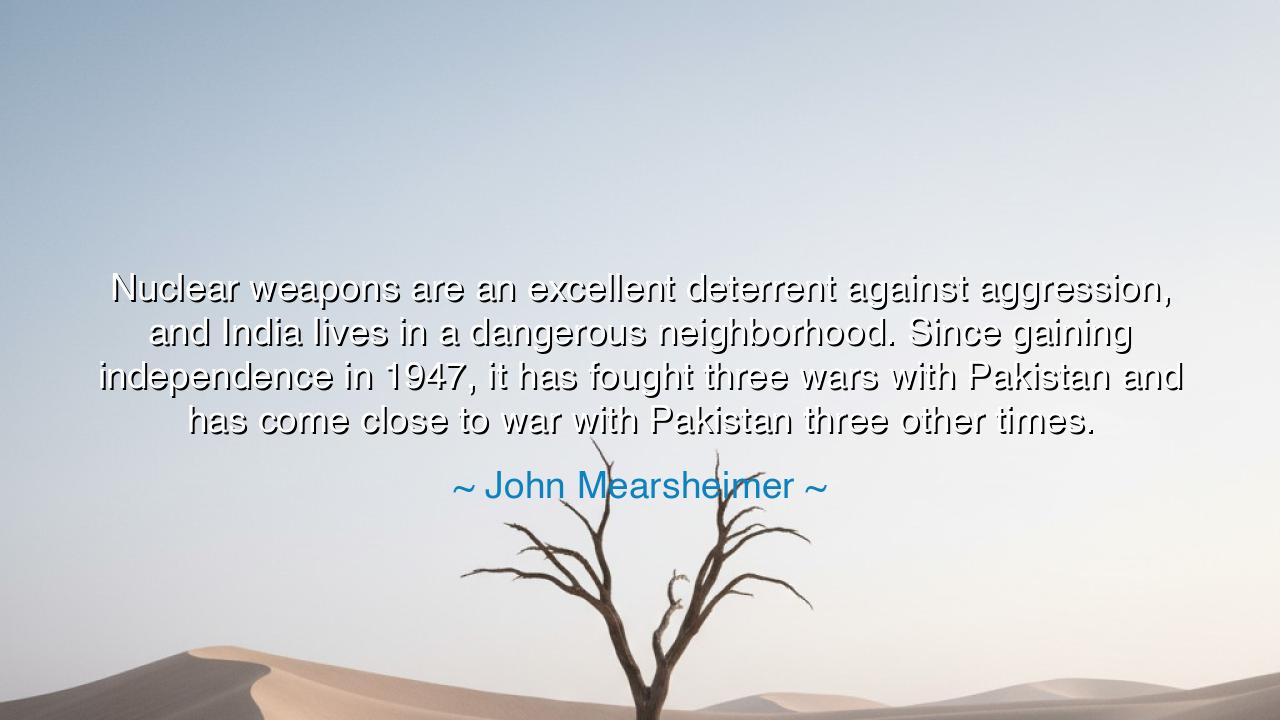
Nuclear weapons are an excellent deterrent against aggression
Nuclear weapons are an excellent deterrent against aggression, and India lives in a dangerous neighborhood. Since gaining independence in 1947, it has fought three wars with Pakistan and has come close to war with Pakistan three other times.






"Nuclear weapons are an excellent deterrent against aggression, and India lives in a dangerous neighborhood. Since gaining independence in 1947, it has fought three wars with Pakistan and has come close to war with Pakistan three other times." Thus spoke John Mearsheimer, one of the great thinkers of modern geopolitics, a man who peers into the heart of nations as the ancients once read the stars. His words are not spoken in celebration of power, but in recognition of a grim truth: that the world is ruled not only by ideals, but by fear, strength, and survival. In this statement, Mearsheimer reminds us that the possession of nuclear weapons, though terrifying in its potential, can serve as a shield of peace in a world where trust is fragile and aggression ever near.
The origin of this thought lies in the long, turbulent history of India’s independence and struggle for security. Since 1947, when the chains of colonialism were first broken, India has found itself surrounded by uncertainties and rivalries—its borders contested, its sovereignty tested, and its patience tried. Against this backdrop, Mearsheimer speaks of a hard wisdom: that power deters violence, and that the balance of terror can, paradoxically, preserve peace. It is not love of destruction that makes nations seek such weapons, but the knowledge that those who cannot defend themselves may one day lose the right to exist freely. Thus, in India’s nuclear strength, he sees not aggression, but guardianship, born from centuries of endurance.
To understand his meaning, we must look to history. In the decades after independence, India and Pakistan—two nations born from the same soil, yet divided by blood and belief—clashed in three great wars: in 1947, in 1965, and in 1971. Each was fought over borders, identity, and survival. The wounds of those conflicts ran deep, leaving scars that shaped generations. Even in years of uneasy peace, the shadow of war never fully lifted. Mearsheimer recalls these trials to remind the world that India’s neighborhood remains fraught with peril—one where diplomacy must walk hand in hand with deterrence.
When India tested its nuclear weapons in 1998, the world trembled. Many condemned it as a step toward destruction. Yet Mearsheimer and others saw another truth—that in a world where rivals already possessed the bomb, India’s choice was not reckless but inevitable. For history had shown that nations without deterrence were vulnerable to coercion, and that peace is often sustained not by trust, but by balance. It is the paradox of power that the weapon designed for annihilation may, in its silent vigilance, prevent war. Since that day, though tensions have flared and tempers have risen, India and Pakistan have not crossed again into full-scale conflict. The sword, though unsheathed, has restrained rather than struck.
There is, in this, a lesson as old as civilization itself: strength must serve peace, not pride. The ancients, too, understood this. When the Roman Empire stood at its height, its legions were not only conquerors but guardians—the peace of Rome, the Pax Romana, was kept by the knowledge that any aggressor would face certain ruin. So it is in the nuclear age: the ultimate power of destruction becomes, paradoxically, the keeper of calm. Yet this balance is perilous, for it demands wisdom equal to strength. A nation that wields such power must do so with restraint, honor, and deep moral clarity—lest the protector become the destroyer.
Mearsheimer’s insight is not an ode to war, but a meditation on responsibility. He speaks of deterrence not as triumph, but as burden. For the possession of nuclear arms binds a nation to vigilance—it must never act in haste, nor yield to arrogance. In India’s case, its conduct since gaining such power has shown a rare maturity: a refusal to brandish its strength for dominance, and a commitment to defense rather than conquest. This is the true meaning of deterrence—not to threaten, but to remind the world that peace endures only when aggression meets resistance.
So, my children of the future, take this teaching into your hearts: peace without strength is fragile, and strength without virtue is fatal. Learn from the wisdom of India’s journey—from the ashes of division, from the fires of war, and from the cool restraint of deterrence. Seek always to build nations that are strong enough to defend the innocent, yet wise enough never to provoke destruction. Remember that power, once gained, must bow before the higher law of conscience.
For as John Mearsheimer teaches, “Nuclear weapons are an excellent deterrent against aggression.” They are terrible, yes—but they remind mankind of its limits, and of the thin line between civilization and chaos. Let us pray that they remain forever as guardians, never as instruments. Let every leader remember that the greatest victory is not to destroy, but to prevent destruction—to ensure that the world’s mightiest weapons serve not death, but the preservation of peace and dignity among nations.






AAdministratorAdministrator
Welcome, honored guests. Please leave a comment, we will respond soon